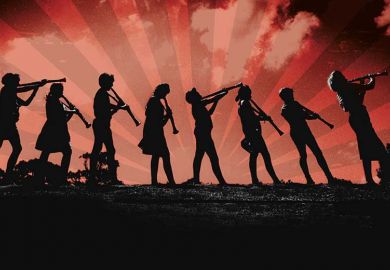The image of US university campuses as places that cultivate liberalism has been challenged by a study which suggests that if students’ political ideologies do change during their time at university, they are more likely to be influenced by their room-mates than by their lecturers.
The research, published in the Proceedings of the National Academy of Sciences of the United States of America, suggests that if campuses do influence undergraduates’ politics, their limited sway favours conservatives.
Such a finding “flies in the face of the culture-war narrative about universities”, said one of the authors, Logan Strother, an assistant professor of political science at Purdue University.
The study is based on data from surveys of more than 1,600 students at two large US universities spaced seven months apart during their first year.
The results show that the proportion of freshers self-identifying with either a liberal or far-left orientation declined from 47 per cent to 44 per cent over the academic year, while those claiming a conservative or far-right ideology increased from 18 per cent to 19 per cent.
Among those students with a room-mate of a different political alignment, more than three-quarters reported the same identity in both their August and March survey responses. But among those who did change, more than three-quarters moved in the direction of their room-mate.
The paper says that it found that students’ ideology “does not change much over the course of their first year on campus, contrary to the stated fears of many high-profile conservative pundits” and where there are changes, “they are generally in the conservative direction”.
“We suspect that influences of college experiences on student ideology might be found less in the classroom than in the dormitory,” the paper adds.
Other researchers have found that US students generally start out liberal and gain appreciation for differing views during their first year of university.
One of these researchers, Matthew Mayhew, William Ray and Marie Adamson Flesher professor of educational administration at Ohio State University, said that different trends emerge in the following three years, when students often show “a massive drop-off in appreciation for conservative ideologies”.
POSTSCRIPT:
Print headline: Share a room and, in time, politics too
Register to continue
Why register?
- Registration is free and only takes a moment
- Once registered, you can read 3 articles a month
- Sign up for our newsletter
Subscribe
Or subscribe for unlimited access to:
- Unlimited access to news, views, insights & reviews
- Digital editions
- Digital access to THE’s university and college rankings analysis
Already registered or a current subscriber?








